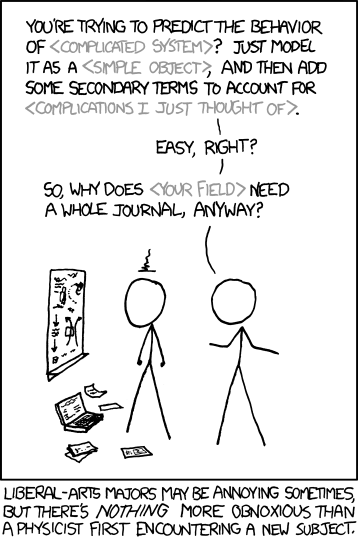Take a very simple example. Labour is the only input, there's a constant returns technology, and labour produces one apple per hour.
Start at full employment, where everyone works 40 hours per week, and nobody wants to work any more than 40 hours. ...The first thing I notice about such simple models is that in such a world, people would have no need of "simple models" to help them understand what is going on. In short, the "simple model" thought experiment has no cognitive dimension.
The End.
(Unless it's an economist trying to sound like a physicist)


6 comments:
OK, agreed, Sandwichman. Models that simple are not worth bothering with. But, of course, the world does not look like that.
Perhaps a more important point is that it does not take all that much increase in complicatedness (notice that I am not even dragging in "complexity," which I distinguish from mere "complicatedness") in order to get some things that are kind of messy. Add a few more technologies with some slightly more complicated relations on output and you can get good old Cambridge capital controversy paradoxes of various sorts.
If Nick Rowe confined his use of simple models to teaching examples, I'd be fine. But he seems to actually believe in them, which is sad.
When Priest Yaoshan was sitting in meditation a monk asked, ”What do you think about, sitting in steadfast composure?”
Yaoshan said, “I think not thinking.”
The monk said, “How do you think not thinking?”
Yaoshan said, “Non-thinking.”
http://nyoho.com/2013/06/06/thoughts-on-not-thinking-about-non-thinking/
Nick is presenting his model to explain a cognitive phenomena -- "fallacies". We don't even need to know what those fallacies are. In a world of such abiding simplicity as Nick's model, fallacies could not be. Whatever it is ("the aspect of mind that measures and evaluates, that holds a yardstick up to experiences or to thought") that gives rise to fallacies doesn't exist in that world. There is no need for it because in Nick's simple world reality presents itself as a yardstick.
In a world of multiple variable for every and all multiplicity of activities the simple model serves the purpose of advancing one point of view over that of any other point of view. It's really very simple. My perception of reality is more accurate than is your perception of that same reality. Given that I am simply right and you are simply wrong about any issue about which we disagree I can explain with a simple model why my analysis of the variables not included in my simple model is more veridical than is your analysis through your own simple model. As noted, I am right and you are wrong as is clearly demonstrated in my simple model.
Jack,
Do I detect sarcasm?
Very simply so. That's the beauty of simplicity, all complex issues can be analyzed and explained in accordance with the simple truth as understood by the simplest individual. Our Congress is a wonderful example of the simple model put into practice. Governing is truly a complicated task, especially so in a pluralistic society. Our Congress, both houses of that branch of the government, is a simple model of the simple people it represents. In any multivariate group of voters a very significant number will be below average on every measurable behavioral trait. That is a simple model of society. Our chosen representatives are a reflection of that simple fact.
Post a Comment